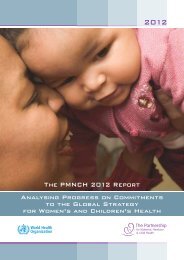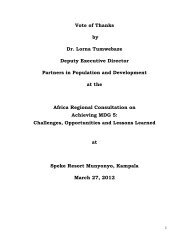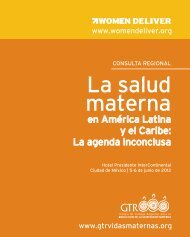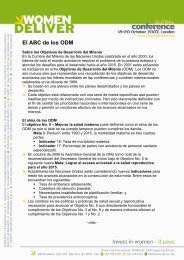taken, the more effective it is. Emergency contraceptionis not effective once implantationhas begun and does not cause abortion. It isintended for emergency use only and is notappropriate for regular use. For longer-termprotection, a copper intrauterine device, wheninserted within five days <strong>of</strong> intercourse, alsoprevents implantation and can be left in placefor up to 10 years (Trussell and Raymond,<strong>2012</strong>). Emergency contraception plays a specialrole in instances <strong>of</strong> sexual violence, armedconflict, and humanitarian emergencies.Given the unpredictable and <strong>of</strong>ten unplannednature <strong>of</strong> young people’s sexual encounters,emergency contraception is especially importantin the range <strong>of</strong> services provided toadolescents and young adults.Rights and the unmet needfor family planningAccording to a <strong>2012</strong> report by the GuttmacherInstitute and <strong>UNFPA</strong>, there are 1.52 billionwomen <strong>of</strong> reproductive age in the developingworld. An estimated 867 million <strong>of</strong> themneed contraception, but only 645 million arecurrently using modern contraceptive methods.The remaining 222 million women have anunmet need for contraception.• An estimated 80 million unintended pregnancieswill occur in <strong>2012</strong> in the developingworld as a result <strong>of</strong> contraceptive failure andnon-use among women who do not want apregnancy soon.• Most—63 million—<strong>of</strong> the 80 million unintendedpregnancies in developing countriesin <strong>2012</strong> will occur among the 222 millionwomen with an unmet need for moderncontraception.• 18 per cent <strong>of</strong> unintended pregnancies occuramong the 603 million women who wereusing a modern contraceptive but haddifficulty using it consistently and correctly,or because <strong>of</strong> method failure.Why is unmet need for contraceptionstill so high?The 222 million women who want to avoidbecoming pregnant for at least the next twoyears but are not using a method actually reflecta slight decline in unmet need between 2008and <strong>2012</strong>. During this time, the number <strong>of</strong>women who wanted to avoid a pregnancy grewby nearly 40 million, and the biggest improvementsin reducing unmet need were made inSoutheast Asia. Despite the gains, there is asignificant need for targeted interventions thatreach underserved communities and marginalizedsub-populations, where unmet need remainsrelatively high.In the developing world as a whole, 18 percent <strong>of</strong> married women have an unmet need formodern contraception, yet in Western, Centraland Eastern Africa and Western Asia, 30 percent to 37 per cent <strong>of</strong> women have an unmetneed for contraception. In the Arab region, asignificant number <strong>of</strong> women have unmet needfor family planning—that is, they prefer to avoida pregnancy for at least two years but are notusing a family planning method. A survey collectedby the Pan-Arab Project for Family Healthfound that only four in 10 married women <strong>of</strong>reproductive age living in the Arab countriesuse modern contraception (Roudi-Fahimi et al.,<strong>2012</strong>). In most Arab countries, women’s ambivalencetowards family planning results from arange <strong>of</strong> factors, including fear <strong>of</strong> side effects,concern with husbands’ reactions, conflictsabout family roles and cultural responsibility forbearing children. This ambivalence declines aswomen grow older.Particularly in Western and CentralAfrica, weak health systems and poor services30 CHAPTER:2: ANALYSING DATA AND TRENDS TO UNDERSTAND THE NEEDS
contribute to high unmet need (Singh andDarroch, <strong>2012</strong>). In virtually all developingcountries, poor women have more children andlower contraceptive use than wealthier women,underscoring the need for programming inresource-poor communities. In sub-SaharanAfrica, women in the top wealth quintile arethree times as likely to use contraception as thosein the lowest wealth quintile (Gwatkin et al.,2007). The major difference between users andnon-users is that some have access to information,have more choices as a consequence <strong>of</strong> theirgreater wealth and schooling, and can act ontheir desire to have fewer children.Women with unmet need for family planningaccount for nearly four out <strong>of</strong> every five unintendedpregnancies (Singh and Darroch, <strong>2012</strong>).Other factors contributing to unintended pregnanciesinclude incorrect or inconsistent use <strong>of</strong>a method <strong>of</strong> contraception, which may be dueto inadequate counselling or information, anddiscontinuation <strong>of</strong> a method without switchingto another method (Singh and Darroch, <strong>2012</strong>).Use <strong>of</strong> modern methods among never-marriedwomen in the developing world as a wholeis much lower than among married women,except in sub-Saharan Africa, where womenhave a strong need for dual protection frompregnancy and sexually transmitted infections,including HIV, and condoms are the predominantmethod used by unmarried women (Singhand Darroch, <strong>2012</strong>).Data also support the need for adolescentandyouth-friendly services. Pregnancies amongadolescents between the ages <strong>of</strong> 15 and 19 frompoor families are more than twice as commonthan they are among the same age group fromwealthy families (Gwatkin et al., 2007). Thesedisparities are compounded by the fact that poorgirls are more likely than wealthy girls to be married,to be uneducated and malnourished andto have preterm or underweight infants. Littleimprovement in access among adolescents overthe past 10 years can be observed in 22 sub-Saharan African countries where one in fouradolescent girls has unmet need for familyplanning (United Nations, 2011c). Marriedadolescents in all regions have greater difficultythan older women in meeting their need forcontraceptive services (Ortayli and Malarcher,2010). But young never-married women als<strong>of</strong>ace difficulties in obtaining contraceptives,largely because <strong>of</strong> the stigma attached to beingsexually active before marriage (Singh andDarroch, <strong>2012</strong>).Contraceptive use lowersabortion ratesAccording to a recent Guttmacher Institutestudy (Singh and Darroch, <strong>2012</strong>), an estimated80 million unintended pregnancies will takeplace in <strong>2012</strong> in the developing world, and40 million <strong>of</strong> them will likely end in abortion.tMobile health educatorin Gabarone, Botswanavisits home.©Panos/Giacomo PirozziTHE STATE OF WORLD POPULATION <strong>2012</strong>31
- Page 6 and 7: OverviewOne hundred seventy-nine go
- Page 8 and 9: The report is structured to answer
- Page 10 and 11: viiiCHAPTER 1: THE RIGHT TO FAMILY
- Page 12 and 13: “All human beings are born free a
- Page 14 and 15: Treaties, conventions and agreement
- Page 16 and 17: Health: a social and economic right
- Page 18: “Everyone has the right to educat
- Page 21 and 22: designing and delivering accessible
- Page 23 and 24: use, and reduces unintended pregnan
- Page 26 and 27: 16 CHAPTER 2: ANALYSING DATA AND TR
- Page 28 and 29: Change in Age-Specific Fertility Ra
- Page 30 and 31: Sexuality, sexual and gender stereo
- Page 32 and 33: not necessarily associated with a d
- Page 34 and 35: METHOD EFFECTIVENESSMethod, rankedf
- Page 36 and 37: tCouple visiting a ruralfamily plan
- Page 38: Demand and supply over time5 per ce
- Page 43 and 44: abortions in the region lead to mor
- Page 45 and 46: (as stated in the Convention on the
- Page 47 and 48: arriers prevent individuals from ac
- Page 49 and 50: CHAPTERTHREEChallenges in extending
- Page 51 and 52: sources of sexual and reproductive
- Page 53 and 54: messages were delivered via a numbe
- Page 55 and 56: Ricardo, 2005). Moreover, young and
- Page 58 and 59: per cent in Guatemala. Across all c
- Page 60 and 61: tTeenager inMadagascar listens toa
- Page 62 and 63: Consensual unions account for an in
- Page 64 and 65: when. The proportion of never-marri
- Page 66 and 67: 63 per cent to 93 per cent of young
- Page 68 and 69: Family planning in humanitariansett
- Page 71 and 72: Studies suggest that HIV may have a
- Page 73 and 74: with a public health challenge (Wor
- Page 75 and 76: State-run family planning programme
- Page 77 and 78: people in mobile, temporary, and re
- Page 79 and 80: systems and civic participation to
- Page 81 and 82: CHAPTERFOURThe social and economici
- Page 83 and 84: tCommunityeducation inCaracas, Vene
- Page 85 and 86: Estimates of Total Fertility2010-20
- Page 87 and 88: children, and healthier women also
- Page 89 and 90:
empirical evidence supporting this
- Page 92 and 93:
tRicardo and Sarain Mexico City say
- Page 94 and 95:
to secure the future population’s
- Page 96 and 97:
86 CHAPTER 5: THE COSTS AND SAVINGS
- Page 98 and 99:
Unintended Pregnancies and outcomes
- Page 100 and 101:
tDonor Commitmentspanel at the Lond
- Page 102 and 103:
UNFPA supports the Health for All c
- Page 104 and 105:
tDr. BabatundeOsotimehin, Executive
- Page 106 and 107:
96 CHAPTER 6: MAKING THE RIGHT TO F
- Page 108 and 109:
When individuals are able to exerci
- Page 110 and 111:
Family planning programmes must ref
- Page 112 and 113:
Family planning programmes reinforc
- Page 114:
tPresident of NigeriaGoodluck Jonat
- Page 117 and 118:
Monitoring Monitoring ICPD ICPD Goa
- Page 119 and 120:
Monitoring Monitoring ICPD ICPD Goa
- Page 121 and 122:
Monitoring Monitoring ICPD ICPD Goa
- Page 123 and 124:
Monitoring ICPD Goals Demographic -
- Page 125 and 126:
Monitoring ICPD Goals - Selected In
- Page 127 and 128:
BibliographyAbbasi-Shavazi, Mohamma
- Page 129 and 130:
Monitoring ICPD Goals - Selected In
- Page 131 and 132:
Monitoring ICPD Goals - Selected In
- Page 133 and 134:
Monitoring ICPD Goals - Selected In
- Page 135 and 136:
Monitoring ICPD Goals - Selected In
- Page 137 and 138:
Monitoring ICPD Goals - Selected In
- Page 140:
Delivering a world where every preg
















